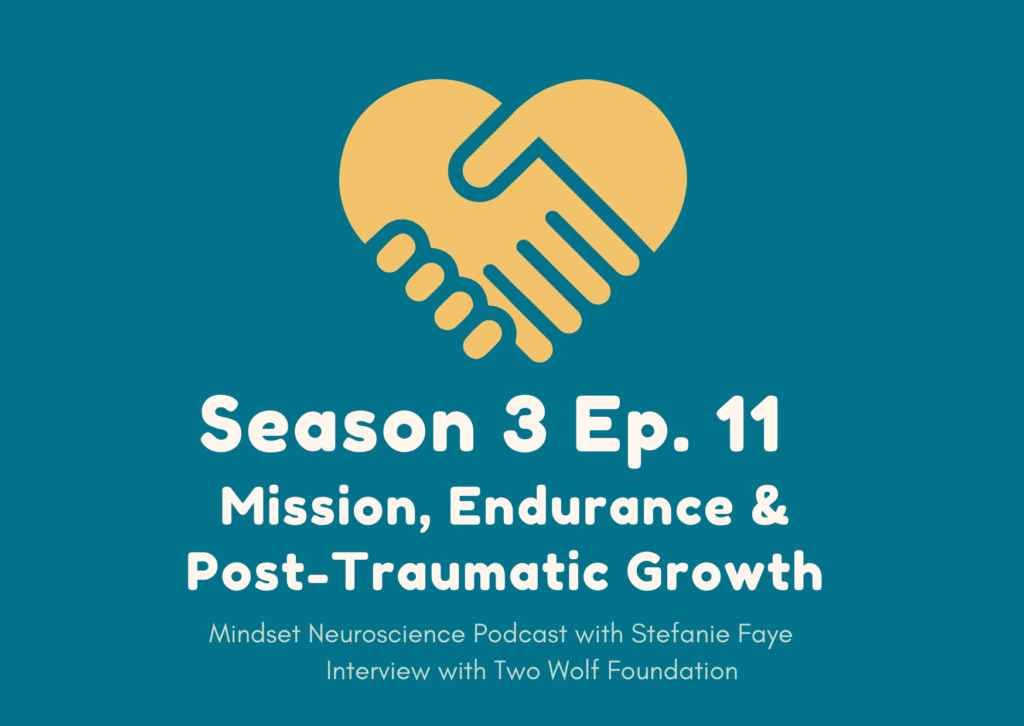
“What man actually needs is not a tensionless state but rather the striving and struggling for a worthwhile goal, a freely chosen task. What he needs is not the discharge of tension at any cost but the call of a potential meaning waiting to be fulfilled by him.”
― Viktor Frankl
In this interview with Brian Flynn of the Two Wolf Foundation, we discuss the idea of a Mission as being a fundamental pillar for mental health, wellbeing and resilience in humans. We look at the idea of a mission as a framework for understanding the pyscho-neurobiological necessity for deep, personal human connection, a sense of meaning - something we continue to strive towards that allows us to feel like we are contributing and paying attention to the wellbeing of ourselves and others.
Two Wolf Foundation is a nonprofit organization dedicated to combat veterans and first responders who have made the choice to continue a journey of personal leadership that includes an integration of their past experiences to move into post-traumatic growth and continued service to others. They do this by leading groups on exciting expeditions to engage in wilderness and public land conservation.
We talk about why this type of mission, mindset and activity helps transform brain activity and sensory-motor patterns into ones that help move thought away from rumination and into the realm of action and kinetic release. These are important mechanisms for us to relieve embodied stress and engage in 'biological completion' of movements that help to amplify positive energy and wellbeing.
The mission planning that occurs is also key in that there is a foresight and planning for things to NOT go as expected, to go wrong. This type of prepartory simulation activity is a major foundation for brain optimization and nervous system regulation - that is not talked enough about, particularly in mental health. It's a neuro-behavioral strategy that can be trained and applied to ALL situations, including social-emotional and relationship dynamics. Simulating multiple scenarios and pathways to navigate helps activate flexibly responsive networks that help us move through all types of situations more adaptively, rather than repeating our reactions from our past.
A few other areas we touched on in this interview include elements of Post-Traumatic Growth inspired by the Boulder Crest Foundation Warrior PATHH program and Dr. Richard Tedeschi and Lawrence Calhoun.. An overview of these are on the Two Wolf website.
EDUCATION
Psychoeducation and knowledge transfer are key pillars for change. By learning about how our nervous system is designed, how it responds to stress, and how our embodied reactions create sensations and movements within us, we activate neural circuits associated with higher order mental functions, pattern recognition, and self-monitoring. All of these create higher levels of access for us to be able to gather data about ourselves in ways that enter our conscious workspace - the place where we can then activate new responses in ways that feel better and get us better outcomes.
REGULATION
Self- and co-regulation are complex topics*. Of particular importance when it comes to trauma is that many of us take for granted some of the mechanisms we have access to that help us dampen a sympathetic state when desired, or up-regulate a dampened state when we need energy. People who have experienced trauma also often experience a disruption of those mechanisms. Because of that, their nervous system may turn to a systems strategy called ‘shifting the burden’ to an intervenor. This is when a system turns to an external source - which can be substances, distractions, devices, consumption, or addiction to people - in order to stimulate or soothe their internal state. When this happens, theinternal mechanisms of the system become atrophied in their ability to regulate. This is the heart of ALL addiction - whether we are talking about technology, drugs, porn, food, etc. We must have the right social conditions and modeling of how to train our systems to become as self-regulating as possible, and flexible in our strategies of what external sources we useto make us ‘feel better’. Diversified portfolios of regulation strategies - whether it’s a variety of people, activities, mental strategies - creates redundancies and flexible pathways for a higher number of conditions.
DISCLOSURE
Being able to put words to our experiences helps us enhance cross-hemispheric activity and increase what is called emotional granularity*. This is the ability to differentiate and nuance our experiences - and the verbal expression of this is highly connected to positive mental health outcomes, optimized brain activity, high levels of Social Understanding and executive functioning (I cover this in chapters 7 and 8 of my book!)
*we talk about this in my interview on Embodied Cognition with Drs.Sheila MacCrine and Jennifer Fugate
STORY
This is where we create a new internal narrative that can transform the meaning of past events into launching points for growth and resilience. When we are supported by growth-oriented people who believe in our capacity to evolve and heal, we can reflect, write and co-create our stories and internal working models into ones that open up pathways for new trajectories.
SERVICE
A purpose beyond oneself, (self-transcendent purpose) is tied to increased motivation to stick to behaviors that will help achive long-term goals. It also activates networks that pull us out of rumination and self-absorption, which can lead to low energy depressive moods because networks become depleted of energy, or can lead to emotional reactivity due to an over-attribution of others’ behaviors to onself. Being of service and part of a mission that involves others helps re-direct our attentional mechanisms to hold others’ perspectives and motivates us to take care of ourselves so that we can show up for someone who needs us.
The mission and vision of this organization is something I believe mental health, education, and personal development sectors can use as a model that correlates with extensive neuroscience research for optimizing brain functioning and social-emotional regulation.
There are so many more topics we cover - including the importance of learning more about veterans - particularly combat veterans, and first responders, in order to enhance our understanding of post traumatic growth and mission mindsets. I go into this more deeply in the introduction as well.
If you'd like to learn more about Two Wolf Foundation, you can check out their website here, or take a look at their beautiful and inspiring videos here.
It was an absolute honor and privilege to have this conversation with Brian. Please send me comments or questions - we have plans to do some more collaborations, as well as with the VOAG group - so please send any other ideas for topics!
"We know more from nature than we can at will communicate. Its light flows into the mind evermore, and we forget its presence."
-Ralph Waldo Emerson
*full episode on self-regulation here, and an overview video here.. More to come... this topic is also covered in my upcoming book, as well in my mini book on self-regulation, co-regulation and super-regulation, which you get as a free download when you subscribe



